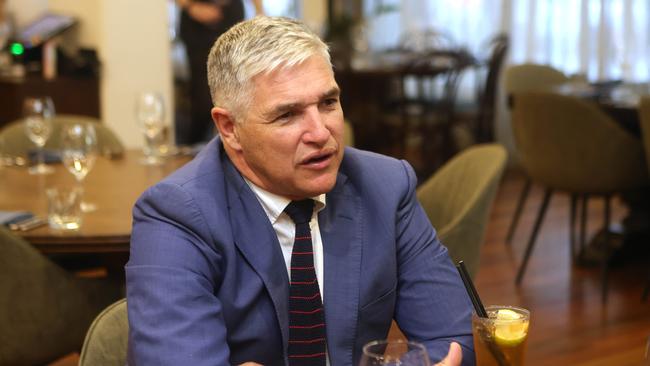
The old Country Party never died – it simply faded away like the curtains during Daylight Savings.
Queensland’s premier rural party went from the Australian Country Party in the 1920s to the National Country Party in the 1960s to the National Party in the 1980s to the LNP in the 21st Century to this bloke sitting opposite me at the Port Office Hotel in Edward St, Brisbane, right in the heart of the Big Smoke.
Robbie Katter, KAP state leader and member for the northwest seat of Traeger, is the latest incarnation of that once-powerful political force which emanated from regional Queensland, shaping the cultural and political contours of the state.
The LNP can claim regional representation. So can Labor, for that matter. But it’s now the KAP which presents itself as the only unequivocal, unapologetic and unwavering advocate of the “bush’’ – or at least the people of that vast electorate outside the densely-populated southeast.
Chomping thoughtfully on 200g of eye fillet, Katter reveals he has not given up shaping the contours of the state. In fact, if he had his way, he’d chop the place clear in half.
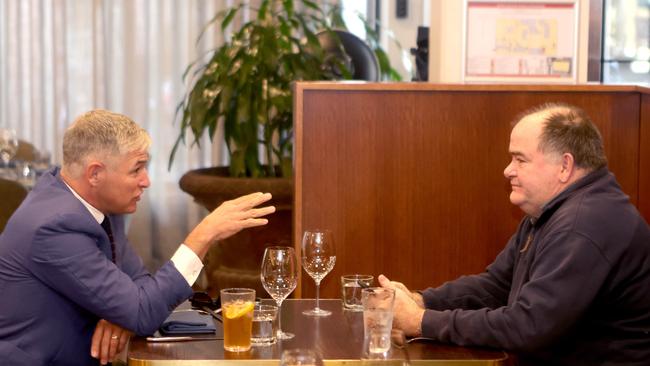
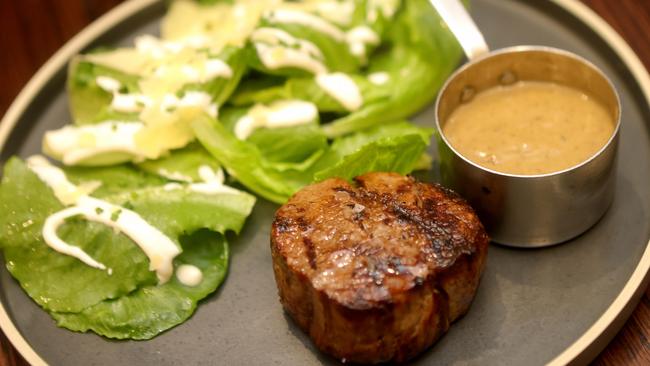
Katter, along with his confederates Nick Dametto and Shane Knuth, would draw a Mason-Dixon line somewhere around Rockhampton, giving us the equivalent of America’s “Dixie’’ in the north, leaving the southern “Yankees’’ to collect their mining royalties elsewhere.
Katter even moved a motion in Parliament last May to that effect, but was largely ignored by a media that has never seriously considered northern secession a viable option ever since the 1860s when a few good ol’ boys up north began pushing for it, then started feuding over which town would be the northern capital.
“Politics is the art of the possible,’’ says Katter in that considered voice which rarely changes pitch, in stark contrast to that of his old man, Bob, who can roar like a lion, descend to a solicitous whisper and giggle like a maniac all within the space of three paragraphs.
“I am not always, like, visionary or anything, but it has been proven to me, time and time again, that things that were well beyond my expectations have come about.
“Copperstring is probably a manifestation of that.”
Copperstring is that $5bn miracle incorporating 800km of new electricity transmission line south of Townsville to Mount Isa, connecting the Northwest Minerals Province to the Australian electricity market for the first time.
“Fifteen years ago it was dad saying ‘we’re gonna do this,’ it was just one of dad’s things,’’ Katter says. “And I thought, ‘pie in the sky’ – good thing to talk about, but nothing will ever happen. And it did.’’
Northern secession, he believes, will also happen, in the manner that the US recalibrated borders and created new states, but it’s hardly something he is going to die in a ditch for as an October election beckons.
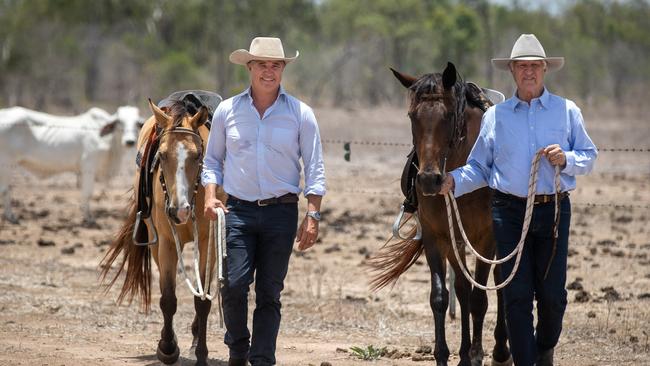
The KAP trio allows itself a reasonable expectation of holding the balance of power in state parliament after the October poll, leaving the trio playing (as Bob Katter Sr, a veteran of hung parliaments, calls it) “piggy in the middle”.
Katter has already indicated an intention to leverage a place on the crossbench. He’s already flagged the option of breaking tradition on remaining neutral on preferences and asking supporters to preference against Labor, because of what he sees as its slack approach to juvenile crime.
And while both Labor and the LNP cosy up to the KAP as the election looms, Katter says his party’s animosity towards both the majors runs deep.
He remembers when the Palaszczuk government robbed the KAP of staff after Labor’s 2015 win, and he still remembers the attacks from the government benches after the Newman government came to power in 2012.
But, as he declares balefully: “Our disdain for this government runs much deeper than the fact that we lost staff. And people still say ‘do you still hate the Newman government for the way they treated you?’ And it’s like – ‘what, because they called me mean names?’ I’m here to deliver for regional Queensland, and that is a little bit bigger than my feelings being hurt.’’
Delivering for regional Queensland, Katter freely admits, is not as easy, given his party has only three MPs.
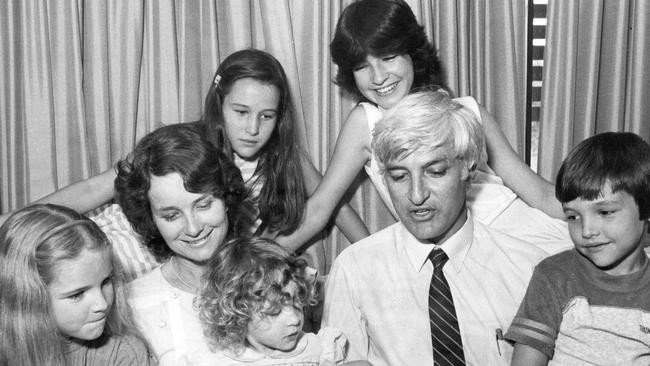
He can quickly grow frustrated discussing the problems he faces, which include the slow destruction of the small towns he’s been acquainted with since his youth. It’s all there in the way governments have permitted a “locum’’ culture among medical staff.
“Look at the way health is handled in small-town Queensland,” he says. “They send locums, and that is predicated on the philosophy – ‘who would ever want to live out there? It’s a small town, it’s probably going to die out, let’s just put locums in there, let’s not build a house for the doctor’.’’
Having grown up with the livestock industry, he appears genuinely puzzled by Green attacks on grazing, and has a clever proposition to put the multi-billion-dollar beef industry in perspective.
“If the beef industry did not exist and someone knocked on Queensland’s door and said ‘we have an industry that complements your natural landscape, that arguably enhances it, that involves private industry managing pests and weeds, that encourages good land management, that reduces fire risk, that produces billions of dollars in revenue, that provides thousands of jobs’ … well, would you be interested in that industry?’’
Yet what troubles him most, and has dogged him for his entire political career, is not a traditional Country Party preoccupation such as the livestock industry, but an Indigenous affairs issue. Very few Queenslanders would be aware that the “Blue Card’’ system simply does not work in pockets of the far north.
The scheme, designed to protect children from predators, makes people ineligible for the card if they have any history of criminal offence, even those offences which might be considered at the lower end of the scale.
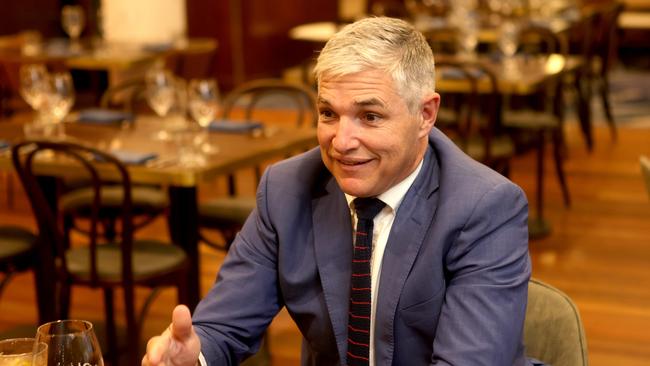
“It was my first or second year in parliament when I first encountered it,’’ Katter says. “It’s driving without a licence, maybe the car is unregistered, everything gets captured and you have someone in Brisbane signing off on it.’’
Only last year, at a local government conference, he was informed that up to 80 per cent of Indigenous adults in one area of the far north would not be eligible for a Blue Card.
The upshot is that the much celebrated “kinship care’’ orders that can redirect indigenous kids away from custody and into the home of an aunt or uncle can so often be useless. There are simply no “kin’’ available.
He knows personally of one young girl from a remote community who was ordered into residential care in Mount Isa after no kinship care could be found.
Dragged kicking and screaming onto the plane to Mount Isa, she lasted two weeks in residential care before hanging herself from a tree. Yet any attempt to change the rules surrounding the issuing of Blue Cards is met with a stone wall in State Parliament.
“People will stand up and say ‘the member for Traeger has an issue here’ and everything is great and good and it looks like we have the support right up until voting time, and then they vote against it.
“Why? Because everyone has to look tough on crime, and the Blue Card system makes it look like we’re tough on crime.
“If anyone out there thinks waving the Blue Card around schools or hospitals is saving the kids from the bad things that are happening there, right now, they are living in dreamland.’’
Katter doesn’t want the Blue Card abolished. He simply wants it made fit for purpose.
Meal finished, he gives it a 10 out of 10, partly because he has developed a fondness for this pub which was once owned by a bloke he knew from its rugby league days – the talented Mike McLean, who has owned a few hotels across Queensland in his time.
“I think he did pretty well in life,’’ says Katter, who, with a growing family and the respect of many fellow MPs on both sides of the house, also appears to be doing rather well himself.

Add your comment to this story
To join the conversation, please log in. Don't have an account? Register
Join the conversation, you are commenting as Logout
City’s coldest June start in 16 years, feels like MINUS 9.8C out west
Southeast Queensland is shivering through its coldest morning in more than 15 years but feels-like temperatures have dropped to insane levels in the southern inland.
Legendary publican’s tragic crash death rocks outback Qld
An outback Queensland publican who saved a now world-famous hotel has died in a shocking crash that his wife miraculously survived.